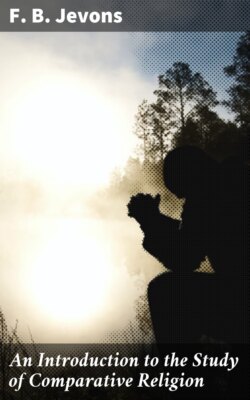Читать книгу An Introduction to the Study of Comparative Religion - F. B. Jevons - Страница 6
На сайте Литреса книга снята с продажи.
MAGIC
ОглавлениеTable of Contents
A view sometime held was that magic is religion, and religion magic. With equal reason, or want of reason, it might be held that magic was science, and science magic. Even if we correct the definition, and say that to us magic appears, in one aspect, as a spurious system of science; and, in another, as a spurious system of religion; we still have to note that, for those who believed in it, it could not have been a spurious system, whether of science or religion. Primitive man acts on the assumption that he can produce like by means of like; and about that assumption there is no "magic" of any kind. It is only when an effect thus produced is a thing not commonly done and not generally approved of, that it is regarded as magic; and it is magic, because not every one knows how to do it, or not every one has the power to do it, or not every one cares to do it. About this belief, so long as every one entertains it, there is nothing spurious. When however it begins to be suspected that the magician has not the power to do what he professes, his profession tends to become fraudulent and his belief spurious. On the other hand, a thing commonly done and generally approved of is not regarded as magical merely because the effect resembles the cause, and like is in this instance produced by like. Magic is a term of evil connotation; and the practice of using like to produce like is condemned when and because it is employed for anti-social purposes. Such practices are resented by the society, amongst whom and on whom they are employed; and they are offensive to the God who looks after the interests of the community. In fine, the object and purpose of the practice determines the attitude of the community towards the practice: if the object is anti-social, the practice is nefarious; and the witch, if "smelled out," is killed. The person who is willing to undertake such nefarious proceedings comes to be credited with a nefarious personality, that is to say, with both the power and the will to do what ordinary, decent members of the community could not and would not do: personal power comes to be the most important, because the most mysterious, characteristic of the man believed to be a magician. If we turn to things, such as rain-making, which are socially beneficial, we find a similar growth in the belief that some men have extraordinary power to work wonders on behalf of the tribe. A further stage of development is reached when the man who uses his personal power for nefarious purposes undertakes by means of it to control spirits: magic then tends to pass into fetichism. Similarly, when rain and other social benefits come to be regarded as gifts of the gods, the power of the rainmaker comes to be regarded as a power to procure from the gods the gifts that they have to bestow: magic is displaced by religion. The opposition of principle between magic and religion thus makes itself manifest. It makes itself manifest in that the one promotes social and the other anti-social purposes: the spirit worshipped by any community as its god is a spirit who has the interests of the community at heart, and who ex officio condemns and punishes those who by magic or otherwise work injury to the members of the community. Finally, the decline of the belief in magic is largely due to the discovery that it does not produce the effects it professes to bring about. But the missionary will also dwell on the fact that his hearers feel it to be anti-social and to be condemned alike by their moral sentiments and their religious feeling … 70–104
